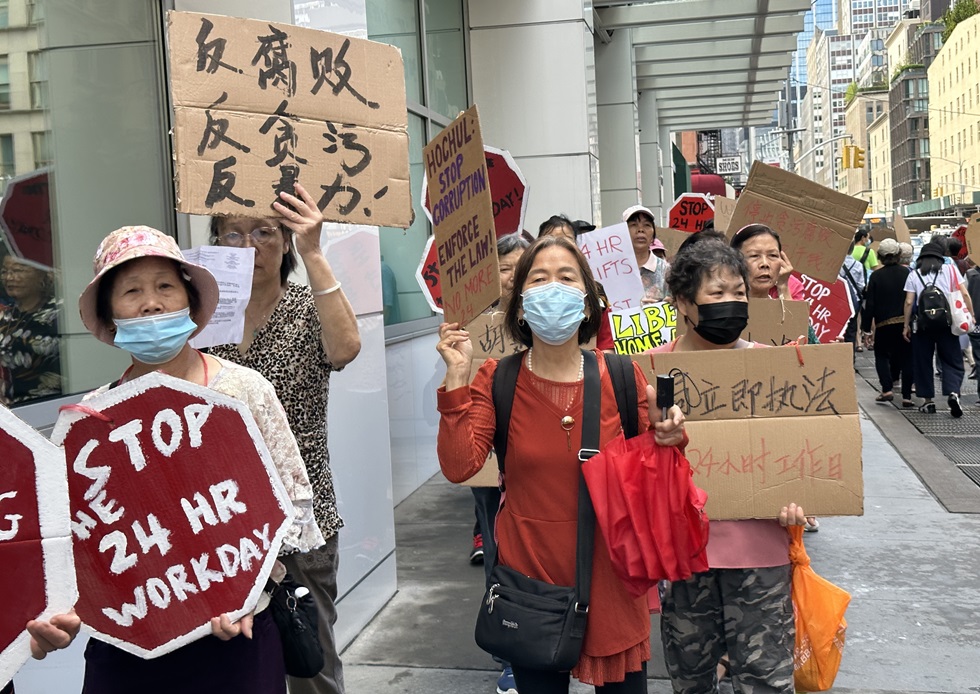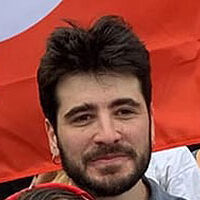
NEW YORK—On March 20, the Chinese Staff and Workers’ Association, alongside the “Ain’t I a Woman” coalition, launched a hunger strike to demand an end to the 24-hour work day for home health care workers in New York City.
These are the workers—mostly women of color—who provide round-the-clock care for seniors and other people homebound due to illness. They cook, clean, change diapers, administer medicine, and more—every aspect of care. Often, they find themselves on the job for 24-hour periods, for several days straight.
NYC is the only place in the state and country where this form of worker hyper-exploitation is allowed. This is due to a regulation that only allows insurance companies and homecare agencies to bill for 13 hours out of 24, supposedly in order to give the “proper” time for meals workers to rest and have meals.
Home health workers are usually hired by non-profit agencies funded by public dollars. Both New York City and the agencies claim home health care workers are able to rest, but this is not the reality. Many are unable to sleep because their responsibilities are extensive and include turning patients to prevent bedsores, taking patients to the bathroom, feeding patients food and making sure their health is monitored throughout the night, as well as overseeing heart conditions and asthma attacks.
For years, home health care workers have fought and organized against their exploitative conditions, which not only take their wages but affects their quality of life and that of their patients. The effort has been sustained by the CSWA, in connection with their fraternal worker center, NMASS (National Mobilization Against Sweatshops).
The action on the 20th is part of the campaign to pass the No More 24 Act in New York City Council, a measure that would “set the maximum working hours that an employer may assign to a home care aide.”

On the job, all day and all night
The Chinese-American Planning Council (CPC) is one of the biggest, ranking as the third largest home care agency in New York State. Home attendants who work for CPC reported in the documentary For Whom the Alarm Sounds that they often have to work to work 24-hour workdays, with only 13 hours’ pay.
Worker-organizer and leader of the hunger strike, Shek Yuk Chee, who is a member of the CSWA said, “All the agencies are lying. They say, ‘The workers are getting enough sleep,’ but obviously no one is getting enough sleep. Every two hours my patient needs to be flipped over to prevent bed sores. 90 or 100-year-old Alzheimer’s patients have so many things wrong with them and everything hurts, I have to take care of this person.”
Shek worked for decades as a home health aid. She first joined the CSWA in October 2021 after a fellow home health care worker told her about the organization. The co-worker told Shek about how their wages had been robbed from them and that the CSWA was working to get the money they were owed.
Many home health workers work multiple consecutive 24-hour shifts, meaning they may end up working as many as 72 to 96 hours straight. For thousands of workers, this 24-hour-plus shift not only underpays them, it also causes them health problems and prevents them from seeing their own families.
“When I was younger, I used to run, climb mountains, play sports, but now I can’t do anything. I get dizzy, my back hurts, my feet and legs are in pain.” said Shek. This cycle of exploitation affects the long-term health and social relationships of the most vulnerable workers, who are driven into working the 24-hour day to survive. Today, according to the film, “90% of home health care workers are women and 75% people of color,” with a predominant amount of home health workers being immigrants.
No More 24
NYC Council Resolution 615, also known as the “No More 24 Act,” would limit home health work to 12 hours for any one shift, or within any 24 hours period, and 50 hours within a week. Activists and city council members who support the measure say that breaking the work into two separate 12-hour shifts will stop unpaid work and prevent workers from being unable to see their families.
“I know that I’m being stolen from. Everybody in this industry knows. Everywhere else in New York State, they have two shifts. Why is it NYC where I have to work the 24-hour shift along with my friends? They’re not only robbing us of our money, they’re ruining us, our family lives and our health,” as Shek Yuk Chee said.
Speaker of the House Adreinne Adams has so far prevented the bill from being brought to the council floor for vote. Adams and some of her colleagues view the No More 24 Act as an expenditure that would cost an additional “$645 million a year in New York City,” or double the amount the city is currently paying, in order to cut shifts to 12 hours and properly pay for workers time.
Critics say Adams continues to prioritize her political and economic connections with insurance companies and agencies over the protection of vulnerable workers. Workers are told by insurance companies that there’s no money for compensation, but at the same time workers see cash going into other projects, such as a new 30-story CPC high-rise office.

Hunger strike
The hunger strike initiated by CSWA and “Ain’t I a Woman” is set to run from March 20 to 27. For many workers, the idea of hunger striking is challenging, but the need to take action and stop this horrifying practice from happening to them and their fellow workers is urgent.
Shek said, “I obviously do not want to go on hunger strike; no one wants to go on hunger strike, and it’s terrible for you. But the 24 hours is worse. We have to fix this. If they keep going with this, they’re going to ruin the lives and health of thousands of our brothers and sisters.”
Many of the workers leading the hunger strike have been employed as home health care workers for 10-15 years or more. Shek has worked decades as a homecare worker and is in charge of getting 26 other homecare workers to come out to the action.
However, many workers are unable to take off from their shifts on the 20th. The home health health care agencies refuse to give workers the days off, and if they do take the days off, they fear not getting any more shifts after that. However, even with this challenge, each worker within the campaign has encouraged their fellow workers to support the strike. They see the fight as being against a situation that is much bigger than just their particular employers.
As CSWA organizer Jun Chang stated, “This isn’t just a women’s or immigrant issue; it’s a working-class issue. Deteriorating working conditions such as these have a tendency to spread. Not many people work a 40-hour week anymore, we work more. The 24-hour shift represents the maximum amount of time our bosses can extract from us in a day, and it’s waiting for everyone if we don’t act now.”
The workers leading this hunger strike wish to not only fight for their own wellbeing, but to stop this cycle of hyper exploitation for others. As many older workers join to strike, they do so with the understanding that their effort will prevent younger people from experiencing this ongoing abuse.
As Shek Yuk Chee powerfully stated, “That’s why we have to keep fighting until the end, until we win this and they’re willing to divide the working day in two. I’m fighting for my life and understand I’m fighting with my life, it’s my only resource. They ruined my life, and what is the point of living? I’m going to fight.”
We hope you appreciated this article. At People’s World, we believe news and information should be free and accessible to all, but we need your help. Our journalism is free of corporate influence and paywalls because we are totally reader-supported. Only you, our readers and supporters, make this possible. If you enjoy reading People’s World and the stories we bring you, please support our work by donating or becoming a monthly sustainer today. Thank you!










